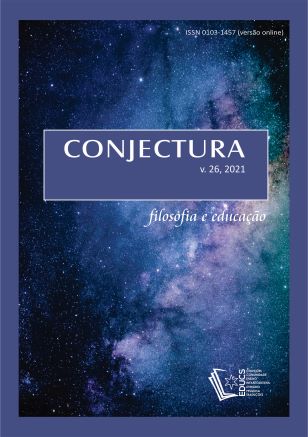Education for thinking: an epistemological analysis of the Socratic dialectical method applied to Lipman’s philosophical pragmatics
DOI:
https://doi.org/10.18226/21784612.v26.e021026Abstract
The present work seeks to make a comparative analysis between Socrates’ dialectical thinking and the pedagogical proposal of the philosopher Matthew Lipman, mainly in his works Philosophy goes to school (1990) and Thinking in education (1995). Therefore, we identified that dialectical thinking as a method appears in Socrates through maieutics, which through dialogue seeks to arrive at a correct thought. This conceptual exercise follows the history of philosophy and gains a central place in epistemological reflections on the process of knowledge that may or may not come from an autonomous subject engaged in the world in which he lives, as we can identify in book VII of the Republic (1949) and in the dialogue by Críton (1997). Lipman, through his pragmatic philosophy, is one of those authors influenced by Socratic dialectics who finds in public debate the way to think about an educational practice engaged in the intellectual and social development of those involved in the process of teaching childhood philosophy. We emphasize that this teaching proposal endorses a critique of the content education model and inserts education to think about the initial years of Basic Education as a contextualized and dialogical reflective process. In this sense, we highlight the Socratic method as adapted to philosophy for children as the result of a pedagogical vision based on dialectical thinking that enables the formation of an epistemological and moral subject. Thinking about education as a tool for social evolution by forming individuals who are sure of their conceptual positions and open to differences, whether epistemological or ideological, seems to us to be one of the main contributions extracted from the pragmatic dialectical approach of philosophy to thinking.
Keywords: Epistemology. Philosophy. Dialogue. Thought. Education
References
ABBAGNANO. Nicola. Dicionário de Filosofia. São Paulo: Martins Fontes. 2007.
DANIEL, Marie – France. A filosofia e as crianças. Tradução Luciano Vieira Machado. São Paulo: Nava Alexnadria. 2000.
DAVÍDOV, Vasili. La enseñanza escolar y el desarrollo psíquico. Prefácio. Moscu: Progreso, 1988.
GALLO, Sílvio. A Filosofia e seu ensino: conceito e transversalidade. Ethica, Rio de Janeiro, v. 13, n. 1, p. 17-35, 2006.
HAMLYN, D. W. Uma História da filosofia ocidental. Tradução Ruy Jungmann. Rio de Janeiro: Zahar, 1990.
LIBÂNEO, José Carlos. Licenciatura: em busca de soluções realistas para a formação de professores. Educativa. Revista do departamento de Educação. Univerisdiade Católitca de Goiás. v. 4, n.2, jul./dez. 2001. Ed. UCG.
LIPMAN, Matthew. O pensar na educação. 3. ed. Tradução de Ann Mary Figueira Perpétuo. Petrópolis: Vozes, 1995.
LIPMAN, Matthew. A Filosofia vai à escola. Trad. de Maria Elicce de Brzezinski Prestes e Lúcia Maria Silva Kremer. São Paulo: Sumus, 1990.
MONDOLFO, R., Sócrates. 3. ed. Tradução Lycurgo Gomes da Motta. São Paulo: Mestre Jou.1972.
PIETTRE. Bernard. Platão: A República - livro VII. Brasília: UNB. 1985.
PLATÃO. Críton. Clássicos Gragos. Brasília: UNB, 1997.
PLATÃO. A República. Tradução Maria Helena de Rocha Pereira. 6 ed. Lisboa: Fundação Calouste Gulbe, 1949.
SARDI, Sérgio Augusto. Primeiros Pensamentos – a filosofia dirigida às crianças é um movimento de descoberta que auxilia no início da educação infantil e no exercício da democracia. Discutindo Filosofia. São Paulo. a.1, n. 3, p. 19. 2008.
SPINELLI, Miguel. Questões fundamentais da filosofia grega. São Paulo: Loyola, 2006.
Downloads
Published
How to Cite
Issue
Section
License
1. The publication of the originals will imply the assignment of copyright to Conjectura Journal.
2. Texts cannot be reproduced without authorization from the Journal after acceptance.









